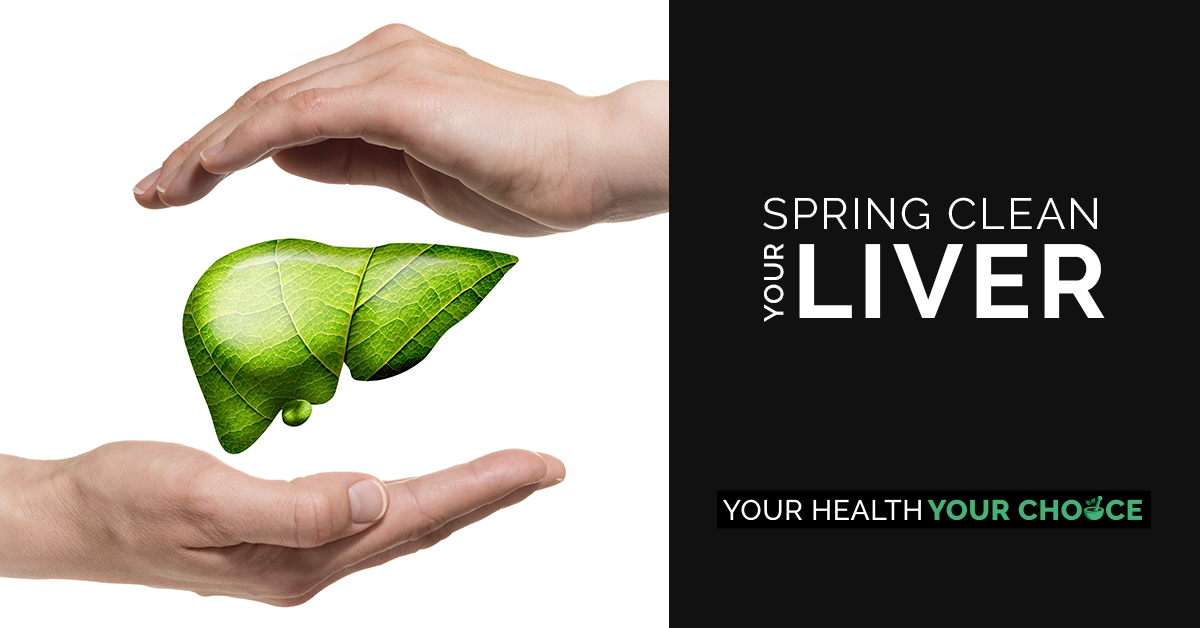Spring clean your liver

Is your multitasking liver working overtime? Have the last 18 months of frequent lockdowns and stress increased your alcohol consumption? Struggled with following a healthy diet and exercise routine or just coping with juggling family while you work from home?
All of the above have the potential to hurt our livers. Fortunately, there is a lot we can do to support and repair this hard-working organ. This article will discuss the best ways to spring clean the liver.
Everything we put into our bodies is metabolised, digested, stored, and produced to some extent in the liver – it performs over 500 functions. It is also the major detoxifying organ in the body. The liver does a lot of heavy lifting and needs regular love and care.
Detoxification
The liver plays an important role in protecting our bodies from potentially noxious insults (from drugs, chemicals and our own toxic metabolites) through its capacity to convert them into more water-soluble metabolites which can be efficiently eliminated from the body via the urine.
Detoxification in the liver is broken into two categories. They are known as Phase I and Phase II liver detoxification pathways. Phase I is the oxidation, reduction and hydrolysis of toxic molecules and phase II is the conjugation of functional groups on these toxic molecules, followed by elimination.
Glutathione and vitamin C are the most important nutrients to facilitate these pathways. Glutathione is poorly absorbed from food, yet diet still governs the body’s levels. The body needs key building blocks to manufacture glutathione from selenium, vitamin E, cruciferous vegetables, alpha-lipoic acid, milk thistle, and cysteine.
Vitamin C helps protect detoxification enzymes, created in phase I and phase II liver detoxification pathways, from oxidative damage. Some research also suggests that vitamin C may play a role in toxin removal.
Healthy liver, healthy thyroid
With almost one third of our population struggling with thyroid disorders, it is imperative we acknowledge the relationship of the liver and thyroid gland. The healthy liver has a vital role in thyroid hormone metabolism and the level of thyroid hormones is also important to normal liver function and metabolism.
Thyroid hormone is converted from T4 to T3 (the active form) in the liver, a crucial stage in energy production. Impaired liver function, therefore, may negatively affect this conversion even if liver enzymes appear to be within normal limits. So, make sure you discuss liver function with your health practitioner.
Fatty liver
Fatty liver is where the fat content of the liver exceeds the normal levels. It is common in people with diabetes and who are overweight, but also in heavy alcohol consumers.
The global prevalence of nonalcoholic fatty liver disease (NAFLD) has dramatically increased in parallel with the obesity epidemic. NAFLD is estimated to affect approximately 30% of adults in developed countries such as Australia and the United States.
Although it might not cause noticeable symptoms, it can lead to significant health complications such as the inflammatory form nonalcoholic steatohepatitis (NASH). Fatty liver is the fastest increasing etiology of end-stage liver disease and hepatocellular carcinoma.
Making changes to your lifestyle is key to preventing and improving these outcomes.
Signs of poor liver function
When your liver function is compromised, symptoms begin to appear that relate to poor detoxification, metabolism, and blood sugar regulation.
- Fatigue and brain fog
- Acne and skin rashes
- Allergies
- Blood sugar imbalances
- Depression and mood swings
- Digestive problems
- Elevated cholesterol levels
- Headaches
- Pain in muscles and joints
Similarly, poor liver function can affect your hormone metabolism and clearance of toxic hormone metabolites causing you to experience symptoms related to oestrogen dominance – like PMS – and putting you at risk for endometrial cancer, breast cancer and prostate cancer.
Blood tests
Liver function tests will not show a stressed or tired liver. They will show elevated liver enzymes when there is liver inflammation – which may be the case with fatty liver. This will warrant further investigation by more blood tests or liver scans to identify the cause of the inflammation.
Depending on the results of the tests, your doctor may suggest that you see a specialist (gastroenterologist). In severe cases, a specialist may organise a biopsy of your liver to confirm the diagnosis and assess how severe the disease is.
Reversing the damage
If your fatty liver is caused by alcohol, then the most important thing to do is give up alcohol straight away. This is essential to a more serious condition such as cirrhosis.
If you have NAFLD, you will probably be advised to:
- Drink no or very little alcohol
- Follow a healthy diet and avoid sugar
- Lose weight
- Exercise regularly
- Control your blood sugar
- Treat high cholesterol if you have it
- Avoid medicines that can affect your liver
- Quit smoking
Changing to a wholefood diet rich in vegetables and fibre and increased exercise have shown to reverse fatty liver disease. Sugar and processed foods must be eliminated altogether.
Supplements for liver repair
- Milk thistle
- N-acetyl choline (NAC)
- Artichoke extract
- Turmeric
- Dandelion extract
- Vitamin C
- Selenium
It is very important to seek professional advice before consuming any of these supplements as they may interact with medications or other health conditions.
Liver-loving foods
Cruciferous vegetables: contain a compound called sulforaphane, which has many health benefits. Broccoli, cauliflower, cabbage, kale, bok choy, and Brussels sprouts are popular cruciferous vegetables. Broccoli sprouts especially provide a large amount of sulforaphane, and have shown to be highly effective in improving liver function through reduction of oxidative stress. Studies have shown that sulforaphane augments and restores blood and cellular glutathione levels, important for liver detoxification.
Avocados: Packing nearly 20 essential nutrients and vitamins; not only are they good for your body, but they feed your liver all the right stuff. Avocados can help neutralize free radicals as well as promote the production of glutathione which helps with toxin removal.
Artichokes: rich in cynarin, chlorogenic acid and other compounds that boost the liver’s detox pathways, protect against oxidative stress and reduce the risk of liver damage. Serving suggestion – steam whole artichokes, then serve with warm olive oil infused with rosemary and garlic.
Choline: Abundant in chicken liver, egg yolks, and spinach, choline is thought to help detoxification of the liver through the processing of fats and cholesterol. Low choline diets have shown to predispose people to fatty liver.
Garlic: Emerging evidence suggests that garlic (Allium sativum L.) and its organosulfur compounds (such as allicin) can significantly mitigate fatty liver progression by the modulation of hepatic lipid metabolism, oxidation and inflammation. Studies show effect from powdered garlic and raw fresh garlic. These studies also observed significant reductions in weight and liver enzyme markers, glucose, and total cholesterol and triglyceride concentration.
Green tea: high in catechins, antioxidants that improve blood markers of liver health, boost liver enzyme levels and protect against oxidative stress and fat deposits in the liver. Some research indicates that green tea may also reduce the risk of liver cancer. If you don’t like drinking it, try combining matcha green tea powder with minced garlic, ginger, sesame oil and rice vinegar for a robust Asian dressing.
Beetroot juice: traditionally been used to activate liver enzymes and increase bile, which helps the liver’s detox function. It contains high betalains and other compounds that have been shown to reduce inflammation, protect against oxidative stress and reduce the risk of liver damage.
Lemon juice: rich in vitamin C and antioxidants, which help in the production of glutathione which works to neutralize toxins in the liver. Just squeeze one lemon into water and drink 2 to 3 times a day.
Move your body
Several clinical trials have shown that both aerobic and resistance exercise reduce the hepatic fat content in as little time as 12 weeks. From clinical and basic scientific studies, it is evident that exercise affects fatty liver disease through various pathways but particularly increases insulin resistance and mitigates excess free fatty acids.
Physical inactivity is related to the severity of fatty liver disease irrespective of body weight, supporting the hypothesis that increasing physical activity through exercise can improve fatty liver disease.
Liver – the emotion of anger
In integrated mind-body approaches to healthcare, the emotions are interconnected with physical ailments. In traditional Chinese medicine (TCM) theory, each of the twelve key meridians corresponds with an organ reflecting a connection to emotion, spirit, and psychology alongside physical function. The liver represents the emotion of anger.
Joanna from @kindred_being_ elegantly summarises the organ relationships with the meridians and outlines the liver as being responsible for the smooth flow of Qi (vital force) and emotions through its relationship with the blood – responsible for filtering, nourishing and cleansing the blood. Regulating liver Qi is achieved through good lifestyle habits, rest, regular, regular meals and staying calm in the face of life’s highs and lows. Joanna points out that without this containment, we may experience liver Qi stagnation which is similar to nervous system ‘unrest’.
This unrest may be experienced as excessive irritability, depression, and anger and can result in multiple ailments including menstrual pain, headache, redness of the face and eyes, dizziness, dry mouth, and in stormy moods.
Clinical studies have also observed depression and anxiety disorder in patients with NAFLD. A TCM study showed that in relation to mood, the liver’s regulation of emotion mainly affects negative emotional experience and the sense of control.
Mark Twain once said,
“Anger is an acid that can do more harm to the vessel in which it is stored than to anything on which it is poured.”
The key word to release anger and resentment is “forgiveness”. Finding ways to reach forgiveness is liberating, healing, and so very good for the liver.
Our liver has far-reaching effects on our overall health. Ultimately, it is something we have control over as its function reflects the choices we make. If we choose less alcohol, a whole-food diet, moving our body and processing our anger, we will be investing in a happier liver and a healthier future.
« Return to News & Features
